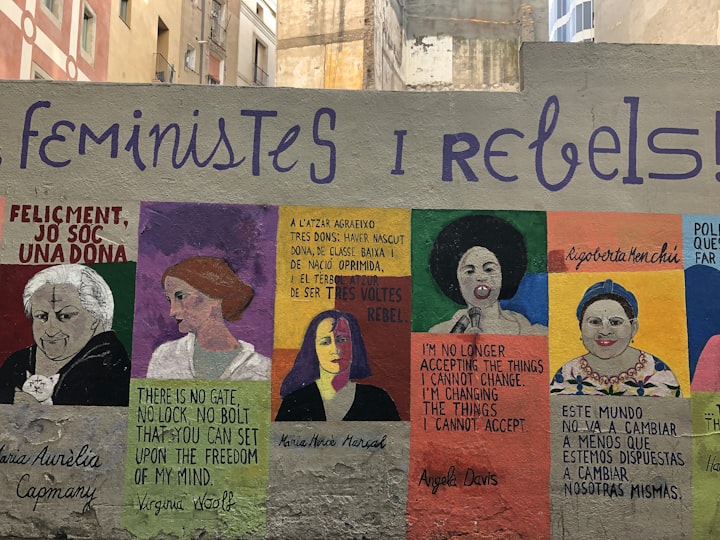Obviously, It's Not A Problem Because It's "Not All Men"
How many tragedies, like the murder of Sarah Everard, need to happen before we start to address the elephant in the room?
Sexual harassment is a type of harassment involving the use of explicit or implicit sexual overtones, including the unwelcome and inappropriate promise of rewards in exchange for sexual favors. Sexual harassment includes a range of actions from verbal transgressions to sexual abuse or assault. Sexual abuse, also referred to as molestation, is abusive sexual behavior by one person upon another. It is often perpetrated using force or by taking advantage of another. When force is immediate, of short duration, or infrequent, it is called sexual assault.
On the surface of society women and men are equal in all regards but beneath it, the idea of equality hasn’t reached the minds of everyone. Women are treated and experience life very differently from their male counterparts in many aspects ranging from comments on the way they dress to the employment opportunities available to them to the dangers they are exposed to when on their own. There have been many catalysts that have forced people to recognise this including the #MeToo movement and recently the tragic murder of Sarah Everard however the impact seems to be temporary, not having a lasting effect on society to bring about the change so desperately needed.
Baroness Jenny Jones suggested that a curfew should be imposed on men in order to ensure the safety of women and what angered me greatly is that the focus of people’s protests is that this was unfair to men as not all of them were the problem rather than alarm that this measure if implemented would be the reason that women would feel and be safe. An article by Arwa Mahdawi in The Guardian addresses this and I agree with every word that she has written.
The expected cost of partying
I love and hate nightclubs in equal measure. I love the electrifying feeling that I get as soon as I step inside one, the pounding of the music reverberating and the strobing lights flashing throughout the room. I feel the adrenaline rushing through my veins and the atmosphere drowns all the worries and stress that I have had at work earlier that day.
I hate them because as soon as I step inside I know I am going to be touched inappropriately, even groped whilst dancing in the sea of bodies. Several times during the night I know I am going to have to slap away a man’s hands as I feel them encircle my waist or push away another who is too close to me or shout at the one who has grinded against me. Not to mention the lewd, sexual, and shocking comments, some with worryingly violent undertones that have to be endured whilst in there.
I am not professing to be a femme fatale, siren, or even the Pied Piper with hordes of men trailing and lusting after me in my wake. This doesn’t just happen to me. It has happened to every single woman I know. Probably, the women you know as well.
A 2017 YouGov poll found that 72% of young people have witnessed sexual harassment in some form during a night in bars, pubs and clubs. Worryingly, 79% of women also said they expected inappropriate comments, touching and behaviour when they went out — either to themselves or to their female friends.
A lesson learned the hard way
We were celebrating a friend's 18th birthday and it was our fourth or fifth time being in a club. We played drinking games, tipping back shots, and mixing the drinks we were served. All of us were drunk. When we were readying ourselves to leave that is when we realised that one of our friends wasn’t with us. Through incoherent, slurred speech somehow we managed to explain to the bartender what had happened and after searching the club he found her huddled in a toilet cubicle covered in vomit. My friend doesn’t remember what exactly happened to her only that evening only that she was heading to the toilets when she was pulled aside by a man and during their altercation, she vomited on herself.
Looking back now in our teenage years we were too young and naive. Sexual assault, rape, and harassment were just words to us, we thought it happened rarely in first world countries and only to women who walked home alone in deserted places, not in public. Even in the movies that we had watched before anything happened to the victim the hero would swoop in to save the day. Up until that point our families, society, and the world had lulled us into giving a false sense of security, an illusion that was shattered that night.
A choice between style or safety
Now if you stepped inside a club and saw us we look like a group of girls having fun and enjoying ourselves like all the other people there. Beneath the carefree facade that girls and women have become used to projecting lies a much darker truth. Within our group, we all have a “twin”, one friend that we are partnered with for the night to ensure we all remain safe. Wherever my “twin” goes I go whether that is to the bathroom, to the bar, or the dancefloor. There are other measures that we take as well like having our locations switched on our mobile phones, a hand signal that indicates distress, guarding each other's drinks, and walking to the train station together.
Up until a few years ago, I wouldn’t ever have worn a pair of flats as my short stature needs the help of those stiletto inches. High heels had an unbreakable hold over me right up until the point when I had to run in them when two young men followed me for several streets after I had left the train station. Since that night I only wear heels without ankle straps as they are easier to remove and I carry foldable pumps inside my purse wherever I go to change into after a night out.
The men reading this article will be wondering why we go to such measures? The women reading this will already know that being female carries an unspoken curse, a silent burden shared between us and passed from generation to generation.
Society needs to change
What we forget is just how recently women were granted equality through legalisation in comparison to how long men have had those rights as significant and progressive change for women has only happened during the last one hundred years or even the last few decades depending on the country in the world for example in the UK it was in 1928 under the Equal Franchise Act that women over the age of 21 were given the same voting rights as men.
Hundreds of years of patriarchy and misogyny are ingrained into the fabric of the world that we live in and until we acknowledge this nothing can change and society will continue to fail women. It is like hacking the branches of a tree that gives poisonous fruit in the hope that one day it won’t when the problem is the tree itself which has to be removed with all the far-reaching roots pulled out to ensure that it doesn’t have the chance to grow again.
Every adult was once a child. Every child grows older to become an adult. Families, education, and society as a whole have a pivotal role in the nurturing and rearing of children. In schools, we teach children how to write essays, solve algebraic formulas, conduct scientific experiments and so much more yet during this impressionable age whilst children are developing, we don’t focus on tackling issues that are prevalent like sexual harassment, discrimination, and racism. We need to ensure that children are aware of matters like consent, sexual harassment, and respect so that when they become adults those teachings guide their behaviour.
A YouGov survey of more than 1,000 women exposes a damning lack of faith in the UK authorities’ desire and ability to deal with sexual harassment — 96% of respondents did not report incidents, with 45% saying it would not change anything. Among those who said the event was not serious enough to report were women who had been groped, followed, and coerced into sexual activity. 97% of women aged 18–24 said they had been sexually harassed, while 80% of women of all ages said they had experienced sexual harassment in public spaces.
A victim only has a chance of seeing justice being served when it is a physical assault as that the boundary between verbal and physical has to be crossed before authority figures and bodies start to pay some attention to it. The odds are stacked against victims, one could argue they favour the perpetrator especially when combined with wealth and privilege. Victims are questioned about the way they dress, told that they misconstrued the situation, or asked to find evidence to prove what they are saying.
We need to ensure that women are better protected by legalisation and policies. The justice system needs to be revised in light of the changes and advances, largely influenced by technology, happening in the world for example the distribution of stolen nude photographs. More importantly, the punishment needs to fit the crime as there are too many cases where immoral behaviour goes unpunished.
Women need to continue to speak out to ensure that their voices are heard, that lessons are learned by society from their personal experiences so that the next generation does not suffer what we and the women before us have suffered. We need men to stand with us, not against us because without them and their support change will not happen, instead, the little progress that has been made for the rights of women in society will unravel.







Comments
There are no comments for this story
Be the first to respond and start the conversation.